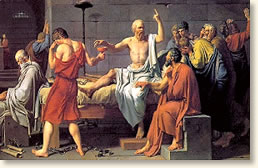In Martyrdom of Polycarp (written following Polycarp’s death in the 160s CE) we find the explicit charge of atheism. The angry crowds shout out “away with the atheists!” in reference to the Christians. And, when Polycarp is brought before the Roman governor (proconsul) of Asia for final trial, Polycarp turns the accusation on his accusers (something more than “I know you are but what am I” is going on):
“Therefore, when he was brought before him, the proconsul asked if he were Polycarp. And when he confessed that he was, the proconsul tried to persuade him to recant saying, ‘Have respect for your age,’ and other such thngs as they are accustomed to say: ‘Swear by the Genius [guardian spirit] of Caesar; repent, say, ‘Away with the atheists!’ So Polycarp solemnly looked at the whole crowd of lawless heathen who were in the stadium, motioned toward them with his hand, and then (groaning as he looked up to heaven) said, ‘Away with the atheists!’”
What determines orthodoxy but the consensus of majority?
If all gods are acceptable and you believe in none but the one--your own--what do you expect?
On the other hand, as Ricky Gervais has said about being called 'atheist', "Of all the thousands of Gods we no longer believe in, I just don't believe in one more than you."
Poseidon, Thor, Athena, Zeus, etc. are NOT believed to exist in our own day and time.
We are A-THEIST (without those gods) by disbelieving or nonbelieving them to be real.
Yet, there is no social stigma connected to this.
Logically, the greater the claim, the greater the proof necessary to substantiate it. The burden is on those who would convince rather than upon those failing to be convinced, right? Well, not entirely!
A rather poor instructor might fail to teach algebra, and that doesn't mean algebra has failed:)
For those who believe Christianity is for SAVING THE LIVES of humans at odd with the divine, surely the only possible emotion for atheists is one of great pity, lamentation, and empathy for their plight as lost souls.
Nonesuch anysuch no such thing, however!
A great deal of disagreeable animus is forthcoming. Historically, the Catholic Church took a policy of torture as remedy for recalcitrant hold-outs! In Islam, beheading is a fit response to non belief in Allah. Of course, the old stand-by, HELL, is always waiting in the wings as well.
Perhaps I should offer my own views at this point.
What is the PRAGMATIC demonstration held out for non-believers as to evidence of brotherhood, acceptance, and love awaiting conversion? Isn't the choice offered a gun to the head, in effect, MY WAY OR DIE?
God offers to protect us from. . . HIMSELF!
At least, that's the distilled take-away offered by Christian evangelicals, is it not?
God will kill you, so, better get on His good side.
In Islam, God is seen as less of a fluffy, huggable, knowable character. To fear God is to cover yo' ass!
Submission TO THE WILL of Allah, is avoidance of consequences rather than a communion of familial
warmth and eternal comraderie.
Judaim doesn't seek converts, Christianity is starved for converts, Islam is armed to the teeth and on the hunt for NON-converts.
Are these the best of all possible strategies?
Let's rethink the automatic, knee-jerk disdain and contempt for ATHEISTS, why don't we? After all--everybody is an atheist toward the majority of gods. Aren't we?
